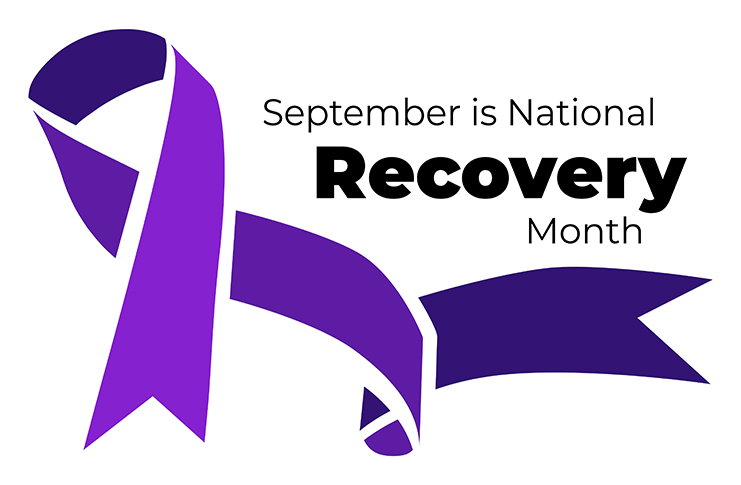Mes Nacional de la Recuperación

National Recovery Month (Recovery Month) is a national observance held every September that increases awareness and understanding of mental health and substance use disorders and encourages individuals in need of treatment and recovery services to seek help. It is also a time for promotion and support of new evidence-based treatment and recovery practices, as well as the dedication of service providers and community members across the nation who make recovery in all its forms possible.
Recovery Month celebrates individuals living lives in recovery and recognizes the dedicated workers who provide the prevention, treatment, and recovery support services that help make recovery possible. Just as we celebrate improvements made by those who are managing other health conditions such as hypertension, diabetes, asthma, and heart disease, we do the same with the gains made by those in recovery from substance abuse.
Recovery belongs to all of us. At CareOregon, we know it is our duty to welcome everyone to recovery by lowering barriers to support, creating inclusive spaces and programs, and broadening our understanding of what recovery means for people with different experiences.
While it may be tempting to characterize recovery as a universal experience or single journey, mental health and substance use disorder are not one-size-fit all conditions, nor do they affect everyone equally. Culturally competent multilingual resources and gender-expansive programs acknowledge and include LGBTQ+, BIPOC (Black, Indigenous, and people of color), and other historically marginalized community members.
Our community is proof that there are as many pathways to recovery as there are people. Our strength is our diversity and because of who we are, the recovery community has unique opportunities to learn, challenge, grow, and dream. By expanding beyond traditional, limited conceptions of recovery, which center white, heterosexual, cisgender, religious, wealthy perspectives, we enrich everyone's experience.
While we reduce the stigma surrounding people with substance use or mental health disorders, especially when complicated by oppressive forces like white supremacy, systemic racism, punitive criminal justice systems, and policy that excludes less privileged people. Recovery is always person-first. "Meeting people where they are at" translates into acknowledging their unique experiences and needs, including people of different cultures, identities, backgrounds, and communities.
Looking beyond our individual experiences strengthens and supports recovery in all its forms. The recovery community has a powerful foundation of mutual aid, peer support, and adaptability. As we grow in empathy and understanding, we save lives by adding protective factors and building resiliency. We honor the incredible contributions from communities within recovery as groups connect and implement resources that serve their unique needs. The powerful bonds built in recovery are life-altering. To honor those bonds, in every form they take, is a significant factor in sustaining recovery as well as building bridges between our communities. When we connect with open minds and hearts, we learn from one another and create life-saving opportunities.
To heal ourselves, our communities must also heal. Recovery Research Institute conducted a nuanced, five-year study that explored the ways in which substance use disorder impacted families, communities, and cultures, and how recovery in those spaces created opportunities to rebuild. The study affirmed that people in distressed communities need opportunities to share their experiences, therefore, personal recovery can translate into collaborative recovery when the individual begins to see their story as part of a larger story. The shift from "I" to "we" is transformative. We call to nurture this "we." We find new ways of connecting the recovery community. We call to rejuvenate struggling communities and families. At the same time, we work to empower communities who grapple with inequitable conditions, including the effects of systemic racism, homophobia, transphobia, generational poverty, adverse childhood experiences, and other forces. Social connections, family support, and neighborhood relationships are directly linked to wellness and recovery. We must ensure that everyone has the same chance at recovery. Our "I" must become our "we."
National Recovery Month educates others about recovery from mental health, substance use, and co-occurring disorders, the effectiveness of treatment and recovery support services, and that recovery is possible. All of us, from celebrities and sports figures to our co-workers, neighbors, friends, and family members, throughout our lives have experienced peaks and valleys, both big and small. And, with strength, support and hope from the people we love, we are resilient.
Substance use treatment services are covered by CareOregon and are available at no cost to members. You can find out more on our Mental health and substance use treatment page.
If you want to follow National Recovery Month online, there are various channels you can access.
• Website: nationalrecoverymonth.org
• Facebook: @nationalrecoverymonthfv
• Twitter: @recoverymonthfv
• Instagram: @recoverymonth_fv
FUENTES:
https://www.samhsa.gov/recovery-month
https://rm.facesandvoicesofrecovery.org/
http://careoregon.org/docs/default-source/members/hso-bhh-explainer-handout-for-members-english.pdf
